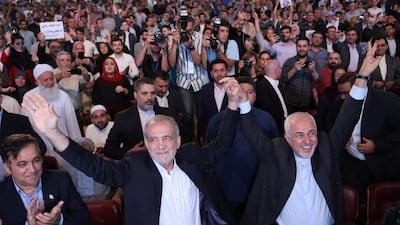Former Iranian foreign minister and 2015 nuclear deal negotiator Mohammad Javad Zarif has been appointed as Vice President for Strategic Affairs by Iran's new reformist President Masoud Pezeshkian.
Mr Pezeshkian has aligned himself with other reformists and moderates and has often been alongside Mr Zarif, who is the President's main advocate and has been involved in the selection process for the cabinet.
Mr Zarif, who served as foreign minister from 2013 to 2021 under the presidency of Hassan Rouhani, rose to prominence as he led Iran's negotiations over the 2015 nuclear deal with world powers.
"You are tasked with overseeing major national and international developments, as well as how far we succeed in achieving the goals of the constitution," Mr Pezeshkian told Mr Zarif in a letter of appointment published by the Irna news agency on Thursday evening.
In 2018, the Trump administration unilaterally withdrew the US from the deal, which included Russia, China, France, the UK and Germany. Western powers have since accused Iran of expanding its nuclear programme and enriching uranium to 60 per cent, which is near weapons-grade levels.
The US has imposed several economic sanctions on the country.
Iran resumed nuclear talks with western powers in 2021 under the presidency of Ebrahim Raisi, who was killed in a helicopter crash in May. The meetings failed to revive the agreement.
Mr Pezeshkian, who has come to power at a time when Iran faces domestic challenges, has vowed to introduce reforms. Mr Zarif's appointment could be further indication of a willingness to return to negotiations on Iran's nuclear programme.
Mr Zarif has generally advocated better relations with western countries and has backed negotiations with the US, but he returns to government at a time of escalating tension in the region, worsened by the assassination of Hamas leader Ismail Haniyeh in Tehran. Mr Haniyeh was in Iran to attend Mr Pezeshkian's inauguration ceremony.
Mr Zarif was at the centre of controversy in 2021, when he was heard in leaked audio recordings laying out power struggles within the regime and criticising Iranian commander Qassem Suleimani, who was killed in a US drone strike in 2020. The leak sent shock waves through Iran a month before Mr Zarif was set to run in presidential elections and drew criticism from the country's supreme leader Ayatollah Ali Khamenei.
Although refraining from naming Mr Zarif directly, Mr Khamenei described the recordings as a "big mistake that must not be made by an official". Mr Zarif offered a direct and extensive apology.
Mr Zarif recently endorsed Mr Khamenei’s stance on upholding a controversial law regarding nuclear negotiations. “Regardless of personal views, the Strategic Action Law regarding nuclear negotiations is the country’s law and must be adhered to,” he said on X.
The law was introduced in 2020 to counter sanctions and increase nuclear activities unless the US returned to the deal. Although criticised by moderates as being an obstacle to returning to nuclear talks, Mr Khamenei last week emphasised the importance of adhering to the law.

